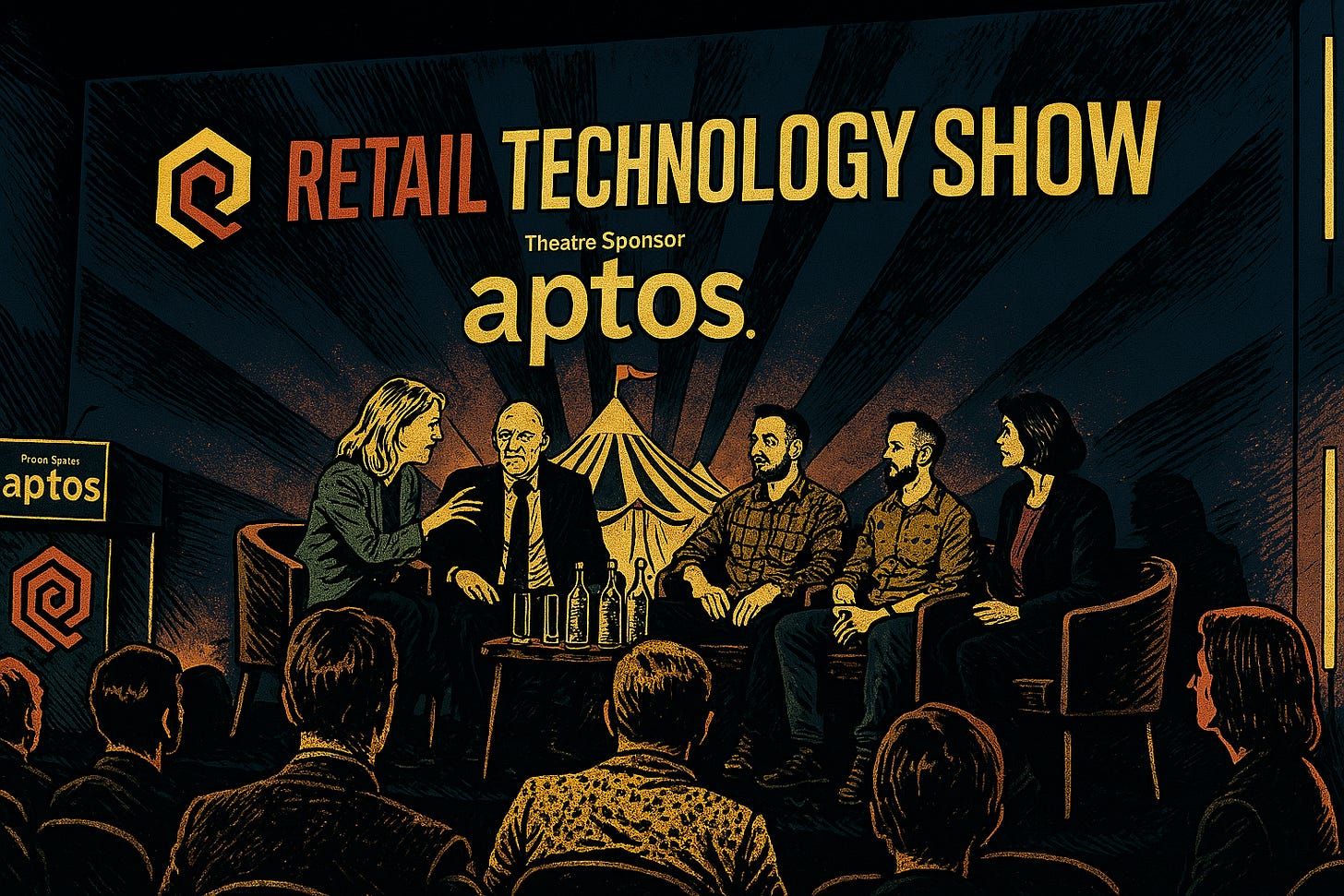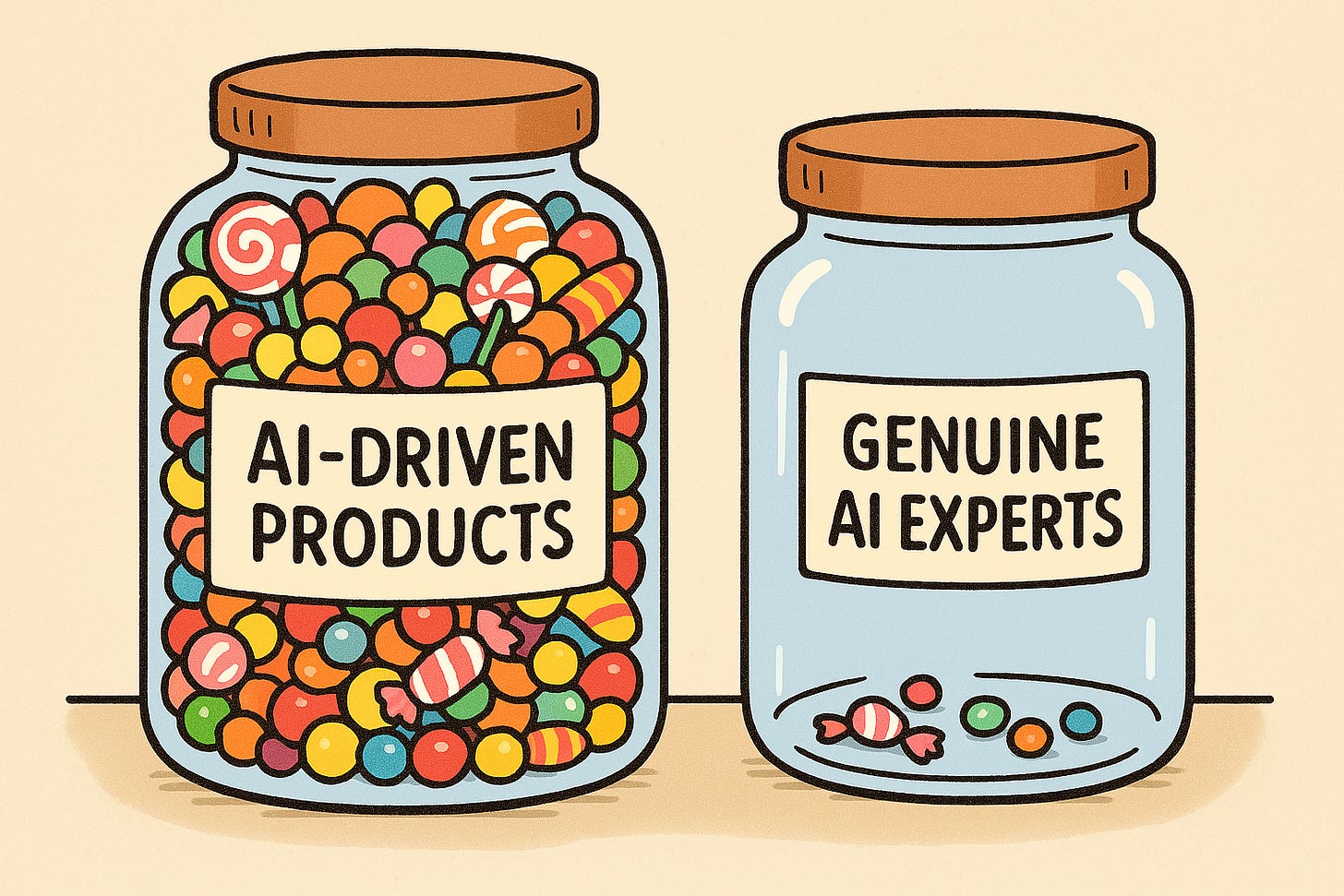What did the Retail Technology Show 2025 tell us about industry trends?
AI, AI everywhere, but barely a specialist in sight...
Me and several thousand others attended the Retail Technology Show at the ExCeL Centre in East London last week.
(With a newsletter called The Retail Technologist it felt somewhat obligatory).
A free 2-day event with notable speakers (Theo Paphitis, Steve Hewitt, reps from Google, Sainsburys, Toshiba, Asos, etc), hundreds of stands, and a fairground theme (and ride), the event hustled by quickly. Fortunately, some of us were taking notes.
So. What did the event tell us about the industry right now?
Everything is AI-driven now, whatever that means
This one you could’ve predicted without going.
Nearly every product stall advertised AI technology in their product.
I’m sure all of those products use AI to varying degrees. What struck me while walking around the event was just how far ahead adoption of AI is compared to understanding of AI, even in the technology sector. A boom time to be a genuine AI expert, no doubt.
Tech companies need to better market what their product’s AI element actually does to succeed in standing out. I use AI to generate images for this newsletter, so I guess theretailtechnologist.com is AI-driven too.
Omnichannel is dead — Long live ‘Unified Commerce’
Are they different?
Are they the same?
Does anyone really know?
Does anyone really care?
Retailers have been trying to join up the customer experience cross-platform ever since the rise of online shopping. All that’s changed are the terms they use to talk about it.
The truth is still that there is no truly unified commerce platform worth having.
Do you really want the same company that built your PoS and your website (Hi Shopify!) to also build your mobile app? What about wholesale? What about marketplaces? What’s your stock master in this situation?
Shopify is the closest thing out there to unified and it doesn’t get close. It can’t. The big beasts don’t want Shopify PoS. Mid-market brands+ want their own apps. Shopify still isn’t the platform for B2B. Any brand with a 7-figure turnover and up has a separate stock master system.
That’s OK. One platform to rule them all still isn’t realistic. Just like it wasn’t realistic 10 years ago. Just like it won’t be realistic in 10 years time. Best-in-breed + quality iPaaS is still the best vehicle to customer experiences that power growth.
MACH Attack
Microservices. API-first. Cloud-native. Headless. MACH.
The TLDR — a modern framework for building software which champions architectural flexibility, stability and integration with 3rd party systems.
And can I just say before I continue — I, for one, am appreciative to the MACH alliance for swooping in just in the nick of time to provide a much-needed acronym to an industry which for too long has humbly struggled with being too plain-speaking.
Anyway. MACH popped up more than I expected and now looks firmly on the march to becoming the industry standard certification for tech platforms looking to prove they’re not going to weigh a tech stack down by being too much of a pain in the arse to integrate or change.
Universal Macro-Economic Gloom
“Times are hard”. “Tough times ahead”.
Many a version of this sentiment was on evidence at the expo.
Retailers across the board said they were working to “sell more, spend less” initiatives.
Stalls for tech designed to prevent store theft and store staff abuse were a fixture.
Tech suppliers were urged to focus on trying to reposition their platforms and services from a cost to a measurable value provider to avoid being culled in cost-cutting measures.
Where are retailers looking for value from the tech? Helping them to do the basics near-perfectly. Keep stock levels accurate. Keep product quality high. Protect the customer experience in-store and online.
Beware Data Swamps
Credit Rob Barnes (Asda CIO) for this one.
In the past, as he tells it, “people used to think that collecting the data was the job”.
And now, across mid-market and enterprise retailers, there are chaotic masses of unorganised data, yielding no insights, solving no problems — swamping things up, big time.
The journey needs to be to turn data swamps into data lakes. Turn chaos into order. Turn opacity into insights. The benefits are clear.
Customer first, tech second; even at the Retail Technology Show
Retailers should deliver the tech their customers want if they are serious about success. Not the tech their staff thinks is cool. Not the tech their leaders think they should implement. So say the retail panelists at RTS 2025, anyway.
And, in contrast to the rapidly accelerating capabilities of various technologies, the message from retailers was that their tech ‘best practise’ is to be evangelically utilitarian — i.e: all tech must have a very clear purpose; especially in relation to keeping in-store experiences simple.
Sensible messaging on how to do tech change
It was good to hear tech leaders at the top of the retail industry saying the right things about how to change/improve tech use.
Tips I noted down and agree with:
Create/identify advocates in the business at all levels who support and understand the change — they are all components in your engine to drive change.
Easy-to-use UX is fundamental to smooth adoption of new systems.
Don’t underestimate the difficulty of change. It probably won’t be a ‘tap in’. Thinking it will might cost you a helluva lot.
Test, test, test. The most important part of any project is UAT.
“Don’t let rumours go ahead of the tech” — you, as a tech leader inside a retailer, should set the narrative about what is coming, not chase it.
Who showed up?
A whistle-stop tour of the technologies that were represented at the expo:
Store security
Cybersecurity (a little bit)
PoS (quite a lot, mostly enterprise)
PIM (a lot)
RFID
Payments
PLM
Robotics (one stall)
iPaaS (a little bit)
And the attendee demographic? Discounting the exhibitors (all suppliers) it was skewed a lot more towards ‘Consultants’ than retailers, in a way which some exhibitors understandably felt wasn’t particularly helpful to their cause. At the end of one talk Andrew Busby repeatedly asked the audience not to sell to the (retailer) panelists as they left the stage.
That’s something the organisers will presumably look to rebalance next time in favour of a heavier retail presence.









